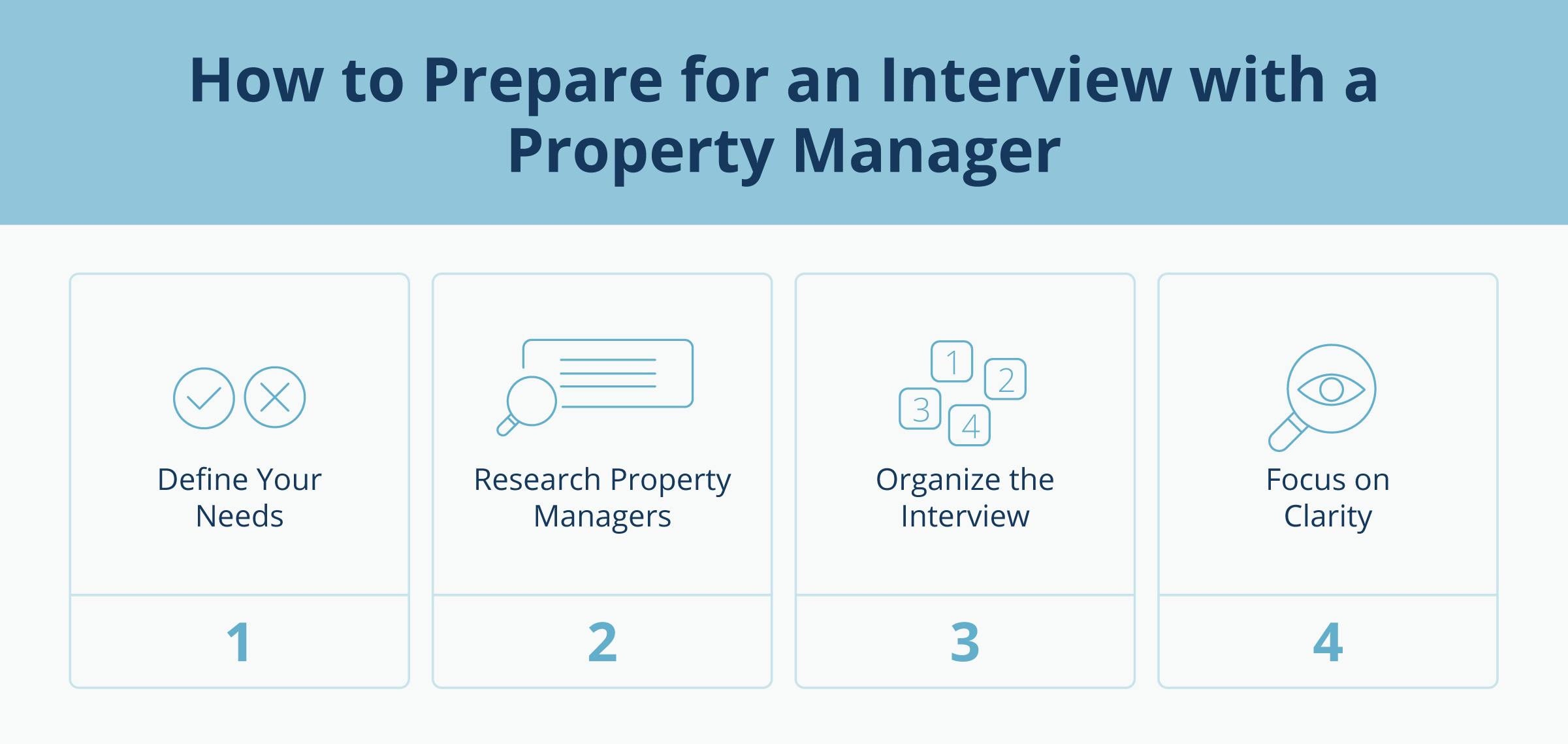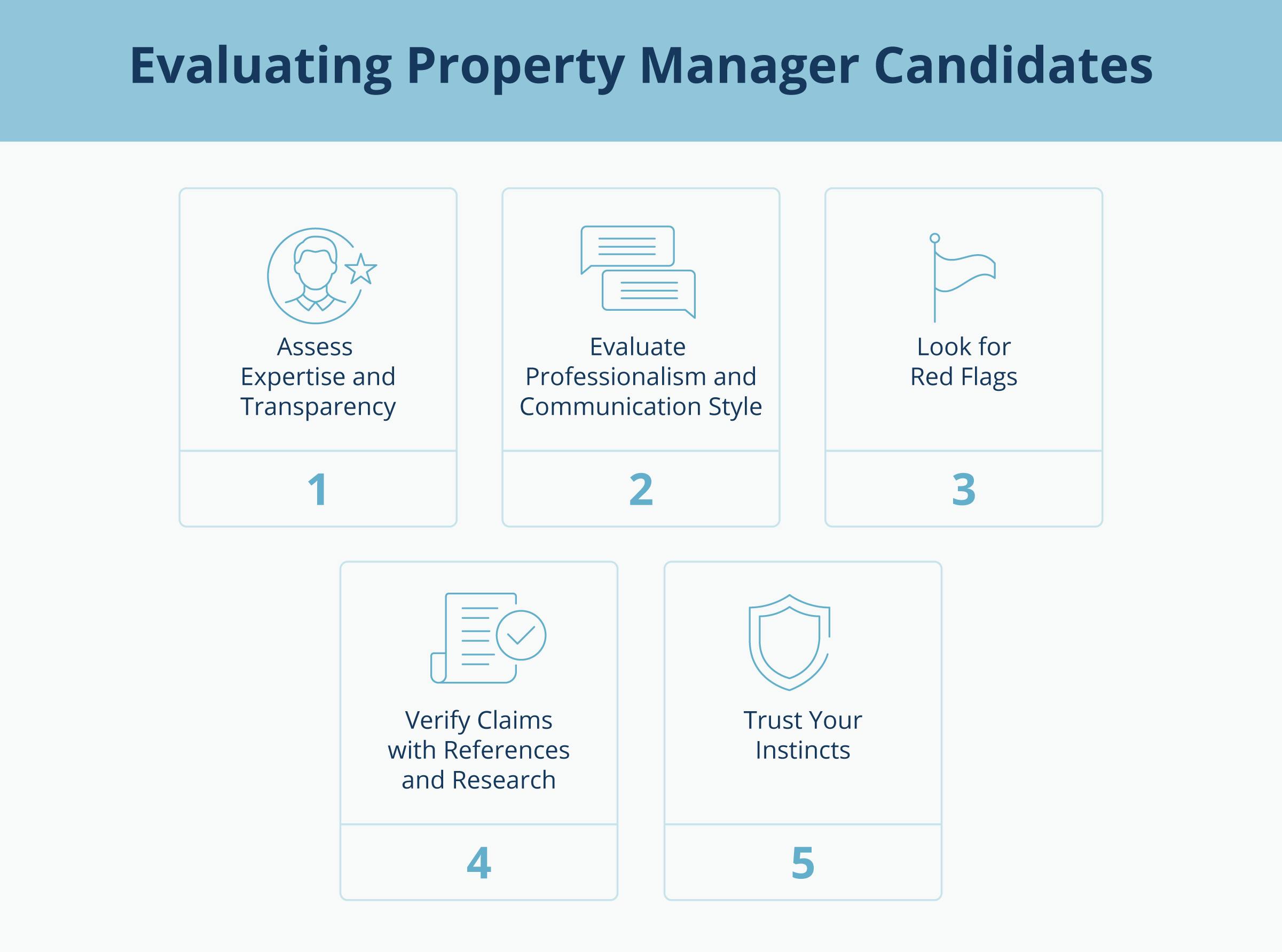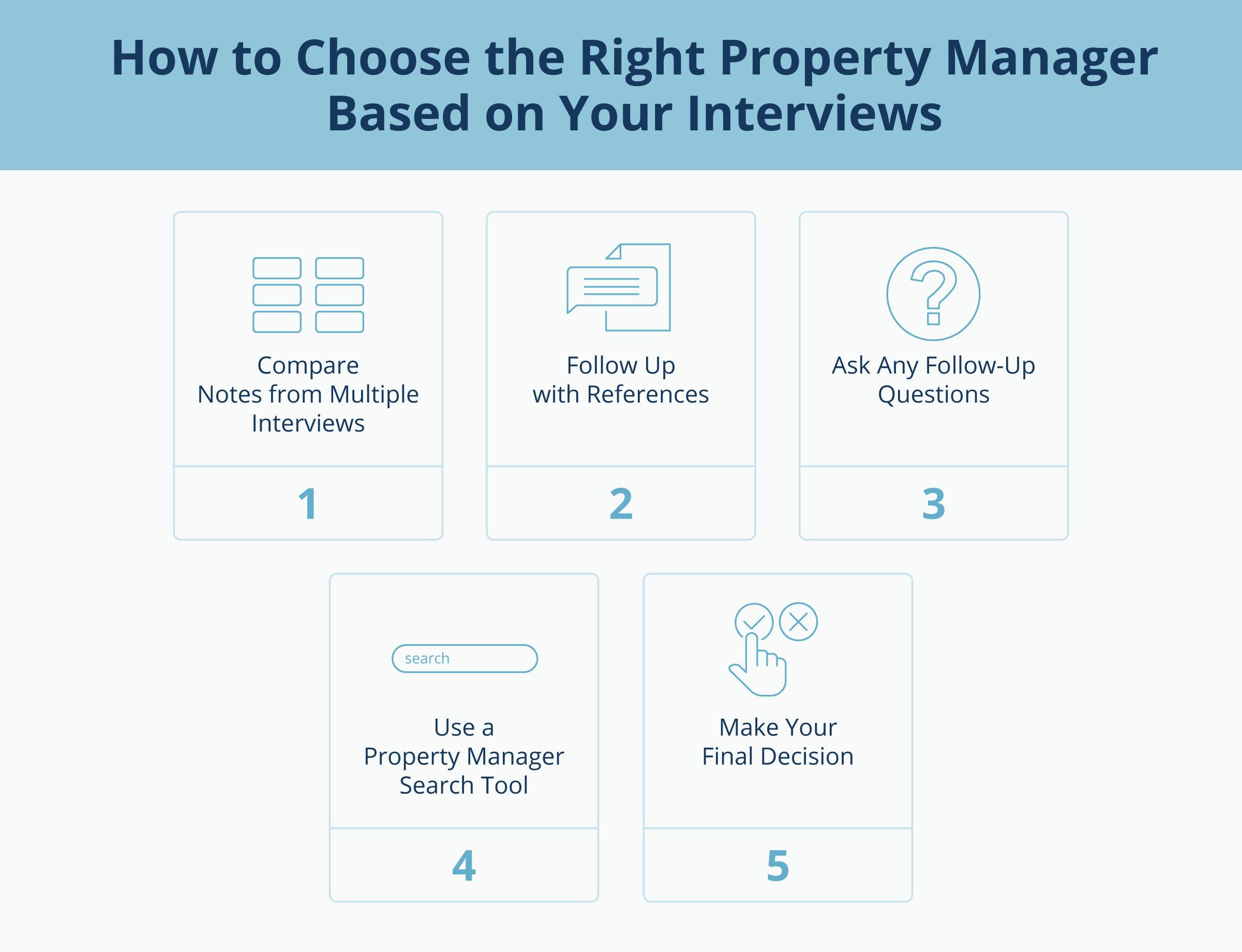Choosing a property manager is a key step for property owners, especially first-time landlords. A reliable property manager can streamline your rental operations, maintain the value of your property, and minimize the stress of managing tenants. However, with so many options available, how do you determine who’s right for your needs?
The key lies in asking the right questions. This guide provides 25 key property manager interview questions to help you evaluate potential candidates effectively. By the end, you’ll feel confident selecting a manager who aligns with your goals and expectations. Plus, we’ll share how you can use our free property manager search tool to explore even more qualified professionals.
And, when you’re ready to find the right property manager for you, we can connect you with the best options in your area here.
Why Interviewing a Property Manager Matters
Hiring a property manager can be one of the most important decisions a property owner makes. A skilled manager not only keeps your property running smoothly but also helps protect your investment and maximize its potential. However, not all property managers deliver the same quality of service, making it important to evaluate them thoroughly before signing a contract.
Interviewing potential property managers gives you a clear sense of their expertise, communication style, and approach to handling the day-to-day challenges of managing a rental property. For first-time landlords, this process is even more vital. Without previous experience, it’s easy to overlook key questions that could expose weaknesses in a manager’s services.
When done correctly, these interviews reveal whether a manager aligns with your goals and can address specific challenges, such as tenant relations, legal compliance, or maintaining your property’s value. A well-prepared set of questions enables you to get the answers you need to make an informed choice.
Selecting the wrong manager can lead to costly mistakes like high tenant turnover, prolonged vacancies, or legal troubles. Taking the time to vet candidates upfront saves time, money, and frustration down the road.
How to Prepare for an Interview with a Property Manager
Before sitting down with potential property managers, it’s important to prepare thoroughly. This step helps you focus on the questions that matter most to you and helps you evaluate candidates effectively. A little preparation can go a long way in uncovering whether a property manager is the right fit for your rental property.

Define Your Needs
Start by outlining your goals for the property and identifying your priorities. Are you focused on maximizing rental income, maintaining the property’s value, or minimizing your involvement in day-to-day operations? Understanding your objectives helps you assess whether a property manager’s services align with your needs.
Consider specific details about your property as well. For example:
- Is it a single-family home, multifamily property, or condo?
- Does it require frequent maintenance or upgrades?
- Are there particular challenges, such as tenant turnover or local regulations?
Knowing these details allows you to tailor your questions to address potential challenges.
Research Property Managers
Once you’ve identified your needs, research property managers in your area. Look for professionals with experience managing properties similar to yours. Online reviews, testimonials, and industry certifications (such as the Residential Management Professional or Certified Property Manager designations) can provide insight into their reputation and expertise.
Referrals from other property owners can also be valuable. Ask colleagues or friends who’ve worked with property managers for recommendations.
We have an easy-to-use directory of property managers sorted by location here.
Organize the Interview
When scheduling interviews, consider whether you’ll meet in person, over a video call, or by phone. In-person or video interviews often allow for a better read on the manager’s personality and professionalism.
Prepare a list of questions (like the 25 provided later in this article) and check that they cover all aspects of property management, including fees, tenant relations, and maintenance.
Bring notes about your property to reference during the conversation. Being specific helps the manager give more detailed answers and demonstrates that you’ve done your homework.
Focus on Clarity
Finally, remember to focus on clarity. Use the interview to not only ask questions but also explain your expectations as a property owner. A strong partnership starts with clear communication, so gauge how well the manager understands your needs and responds to your concerns.
25 Interview Questions to Ask a Property Manager
Interviewing a property manager requires preparation. These 25 questions will help you understand their experience, approach, and ability to meet your needs. With each question, consider how their answers align with your expectations.
You can download a PDF version of this interview checklist here.
General Background and Experience
- How long have you been managing properties?
A seasoned property manager is more likely to have handled various challenges, from tenant disputes to market shifts. Their years of experience can offer confidence in their ability to handle your property effectively. - How many rental properties do you currently manage?
This question helps you gauge their workload. Too few properties might indicate a lack of trust from other owners, while too many could suggest they may not dedicate enough attention to your property. - Do you specialize in managing specific types of properties (single-family homes, multifamily, etc.)?
A manager familiar with your property type will understand the unique needs, market conditions, and tenant expectations associated with it. - What professional certifications or licenses do you hold?
Certifications such as Certified Property Manager (CPM) or Residential Management Professional (RMP) signal expertise and commitment to staying updated on industry standards.
Services and Fees
- What services are included in your management fees?
Some managers offer comprehensive services covering everything from tenant acquisition to legal compliance, while others focus on basic tasks like rent collection. Clarify what you’ll receive for the fees charged. - How are your fees structured? (Flat rate vs. percentage of rent collected)
Flat rates offer consistency, while percentage-based fees vary with rental income. Knowing their fee structure helps you compare costs across potential managers. - Are there any additional costs I should know about?
Some managers charge extra for lease renewals, maintenance markups, or tenant turnover. Ask upfront to avoid surprises. - Do you charge for vacant property management, and if so, how much?
Verify whether you’ll incur fees when the property isn’t generating rental income. Understanding these costs is key to keeping a strong budget.
Tenant Screening and Leasing
- What is your tenant screening process?
Tenant screening determines the quality of renters. Look for managers who conduct credit checks, rental history reviews, income verification, and criminal background checks to minimize risks. - How do you determine the appropriate rental rate for a property?
A reliable manager should use market research, property comparisons, and tools like rent analysis to set a competitive price while maximizing your revenue. - What steps do you take to market and fill vacant properties?
Ask about their marketing strategies, such as professional photos, online listings, and advertising on platforms like Zillow or Apartments.com. - What is your average time to lease a vacant property?
Long vacancies impact your cash flow. Managers with a history of quick turnovers can help reduce downtime.
Maintenance and Repairs
- How do you handle maintenance requests from tenants?
Understanding their system for receiving, tracking, and addressing requests keeps your property well-maintained and tenants satisfied. - Do you have an in-house maintenance team, or do you use third-party vendors?
Knowing who handles repairs helps you assess their ability to promote quality and control costs. Ask if they get competitive quotes for larger projects. - What is your process for handling emergency repairs?
Emergencies require immediate action. Make sure they have protocols to address urgent issues like plumbing or HVAC failures, even outside regular business hours. - How do you ensure maintenance costs are reasonable and competitive?
Managers should have strong vendor relationships or perform cost comparisons to protect your bottom line.
Financial Management
- How do you collect rent payments, and what options do you offer tenants?
Offering multiple rent payment options, such as online portals, ACH transfers, or checks, promotes convenience and reduces delays in rent collection. - What is your policy for handling late or missed rent payments?
Timely rent collection is key for maintaining cash flow. Confirm that they have a clear, consistent policy that complies with local laws. - How often do you provide financial statements or reports to property owners?
Regular reports on income, expenses, and maintenance costs provide transparency and help you track your investment’s performance.
Legal Compliance and Dispute Resolution
- How do you handle tenant disputes or complaints?
A professional approach to resolving tenant issues minimizes potential escalations and protects your property’s reputation. - What steps do you take to promote compliance with local rental laws and regulations?
Compliance reduces the risk of legal disputes. Ask how they stay updated on laws regarding evictions, leases, and safety requirements. - Can you assist with eviction proceedings if necessary? What does that process look like?
Evictions are complex and time-sensitive. Confirm their experience with local eviction laws and ability to handle the process efficiently.
Communication and Technology
- How often can I expect updates about my property?
Consistent updates keep you informed about property performance and potential issues. Ask about their preferred reporting frequency. - Do you offer an online portal for owners and tenants? What features does it include?
Online tools streamline processes like rent collection, maintenance requests, and viewing financial reports. Confirm the availability and functionality of these tools. - What is your preferred method of communication for routine updates or emergencies?
Whether it’s email, phone, or online messaging, be sure their communication style matches yours for a seamless working relationship.
How to Evaluate a Property Manager Candidate
Once you’ve asked the 25 key questions, the next step is to evaluate the property manager’s responses. Pay attention to both what they say and how they say it. A well-qualified manager should provide clear, confident answers that demonstrate their expertise and commitment to meeting your needs.

Assess Expertise and Transparency
- Detail-Oriented Answers: Look for managers who provide specific examples or detailed explanations rather than vague or generic responses. For instance, when discussing tenant screening, they should explain how their process minimizes risks, not just say, “We find great tenants.”
- Proven Experience: If they claim expertise in a specific area, such as legal compliance or managing multifamily properties, they should be able to back it up with examples of past successes.
- Transparency on Fees: Honest managers will outline their fee structure clearly, including any potential extra costs. If they hesitate or provide inconsistent information, it may indicate hidden charges.
Evaluate Professionalism and Communication Style
- Responsiveness: Did they respond promptly to your initial inquiries? A good property manager values clear and timely communication, which is needed for resolving tenant issues and keeping you informed.
- Professional Demeanor: Pay attention to their tone and behavior during the interview. A manager who is respectful, attentive, and approachable will likely provide the same treatment to your tenants.
- Alignment with Your Style: Consider how their communication preferences match yours. If you prefer frequent updates and they only offer quarterly reports, you might need to reconsider.
Look for Red Flags
Some answers—or lack of answers—might signal potential problems. Be on the lookout for:
- Vague or Evasive Responses: If they can’t provide details about their tenant screening process, maintenance protocols, or legal knowledge, they may lack the expertise you need.
- Overloaded Portfolio: If they manage too many properties, they might not give yours the attention it requires.
- Resistance to Providing References: A refusal to share references from past or current clients could indicate dissatisfaction with their services.
Verify Claims with References and Research
- Check References: Follow up with the references they provide to confirm their claims about performance, reliability, and communication. Ask specific questions, such as: “How quickly did they resolve maintenance issues?” or “Were financial reports accurate and timely?”
- Research Online: Read reviews from other property owners and tenants. Consistently positive feedback about professionalism and service quality can validate their reputation.
Trust Your Instincts
Finally, trust your intuition. If something feels off or if their answers don’t fully satisfy your concerns, continue your search. The right property manager will not only meet your technical requirements but also give you peace of mind.
How to Choose the Right Property Manager Based on Your Interviews
After completing your interviews and evaluating responses, it’s time to take action. The following steps will help you narrow down your options and confidently select the property manager best suited for your rental property.

Compare Notes from Multiple Interviews
If you interviewed multiple property managers, compare their answers side by side. Look at key factors such as:
- Service Offerings: Did they provide all the services you need, like tenant screening, rent collection, and legal compliance?
- Fee Structure: Were their fees reasonable and clearly explained?
- Experience: Did they demonstrate expertise in managing properties like yours?
Create a simple chart or list to score each manager in these areas. Seeing their strengths and weaknesses laid out visually can make the decision-making process easier.
Follow Up with References
Contact the references provided by your top candidates. When speaking with current or past clients, ask questions such as:
- “How well did they communicate with you and your tenants?”
- “Were they proactive in addressing maintenance or tenant issues?”
- “Would you recommend their services to another property owner?”
References can offer valuable insights that help you confirm whether a manager delivers on their promises.
Ask Any Follow-Up Questions
If certain answers during the interview left you unsure, don’t hesitate to follow up. For example, if a manager mentioned a property management technology platform but didn’t elaborate on its features, ask for a demo or more details. The right manager will be happy to address your concerns.
Use a Property Manager Search Tool
Finding the right property manager doesn’t have to stop with your initial interviews. If none of the candidates feel like the right fit, expand your search using a property manager search tool. This resource connects you to qualified professionals in your area, saving you time and effort while broadening your options.
Make Your Final Decision
Once you’ve gathered all the information and feedback, trust your research and instincts to make your final choice. Choose a manager who aligns with your goals, communicates effectively, and demonstrates both expertise and professionalism.
Making Sure You Hire the Right Property Manager
Hiring a property manager is one of the most impactful decisions a property owner can make. The right manager can simplify your rental business, improve tenant satisfaction, and maximize your investment’s potential. By asking the 25 questions outlined in this guide, you can assess a property manager’s qualifications, professionalism, and ability to meet your specific needs.
Take the time to prepare for interviews, evaluate each candidate’s responses, and follow up with references to confirm their claims. Remember to trust your instincts—this partnership should feel like a strong fit for both you and your property.
If you’re still exploring options, consider using our free property manager search tool. It connects you with trusted professionals in your area, making it easier to find someone who aligns with your goals. Don’t settle for less when it comes to protecting your rental property and providing a positive experience for your tenants.